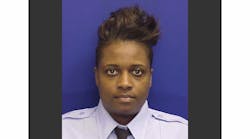Philly Firefighter Recalls Last Moments of Fallen Colleague
Source Philadelphia Inquirer
In the moments before Philadelphia firefighter Joyce Craig lost her life in a West Oak Lane house fire, her coworker Nyree Bright stood at the top of a stairway filled with flames.
Bright, on the job for just over two years, was holding the nozzle on a hose - the first line of attack in a predawn basement fire last Dec. 9. Her lieutenant and Craig, a decorated 11-year veteran working an overtime shift, were behind her.
Minutes earlier, when they had walked into the house on the 1600 block of Middleton Street, only a light, hazy smoke had filled the first floor. The house's owner, a 73-year-old woman, had walked out on her own.
But then someone opened the basement door, and a burst of flames shot up the stairwell. As Bright directed the nozzle down the stairs, she said in an interview Thursday, her breathing mask collapsed around her face. Unable to breathe, she said, she handed the hose to her lieutenant and left the house.
She said she last saw Craig on her knees in a smoke-filled dining room, apparently adjusting her own mask.
Moments later, the fire would flash over. Her lieutenant, disoriented and dazed, would stumble from the house.
Craig's Mayday alert would sound, over and over again, on the fire radio. But, Bright and other sources say, it went unheeded.
It would be at least six minutes, according to multiple sources, before officials realized someone had been left behind.
Bright's recollection of the blaze, corroborated by sources familiar with the situation and fire radio transcripts reviewed by The Inquirer, provides the first detailed account of what happened on the day Craig became the city's first female firefighter to die in the line of duty. It suggests a chaotic scene on Middleton: fire conditions that quickly became dangerous, delays that turned perilous, and widespread miscommunications at the scene that may have proved deadly.
Craig's death sent the city into mourning and prompted the Fire Department to promise a full investigation. The department has yet to provide an explanation of her death and has repeatedly declined to give details on its investigation.
Fire Capt. Clifford Gilliam said in an e-mail Thursday that the investigation was ongoing and that a report would be released upon its conclusion.
For her part, Bright says that since the night of the fire, she has shouldered the brunt of the blame for Craig's death. She has been placed on unpaid medical leave for stress that the department maintains is unrelated to the fire. The firefighters' union says this has allowed the department to strip her of her benefits.
"It's very unfair to put the blame on one individual when it clearly appears that many different things that night went wrong," said president Joe Schulle of Local 22 of the International Association of Fire Fighters. "A chain of events occurred, and not one specific action that led to this tragedy occurring."
Gilliam said, "No firefighters have been disciplined in regards to this ongoing investigation."
Nyree Bright said she couldn't breathe. She was part of a three-person team from Engine 73, the first company to respond to the fire. Engine companies are equipped with hoses and are charged with attacking the fire.
Craig, a 36-year-old mother of two assigned to Engine 64 in Crescentville, was working an overtime shift with Engine 73. She and Bright were the same age, and had spent the overnight shift before the fire talking about their children, their jobs, and even about problems with the department's new masks. Their seals had a tendency to detach, Bright said.
Craig's job in the three-person unit was to feed the line to Bright, working the nozzle. Craig was in the dining room of the cramped rowhouse, with Bright and the lieutenant closer to the fire, when, Bright said, her mask malfunctioned.
Bright said she's unsure why her mask collapsed. She thinks, in hindsight, that she should have opened her air bottle more.
Holding the nozzle at the top of the stairs, she said, she felt as if she were "breathing through a plastic bag."
"I have to get air," she said she told her lieutenant, and handed the nozzle to him. She took off her mask and her helmet. "I had to leave out of there," she said. She passed Craig, and said she told her to move closer to the lieutenant.
But once Bright got outside, she said, the fire erupted, engulfing the first floor.
Over the radio, as a driver replenished her air bottle, she could hear Craig's voice, which, according to radio transcripts, would be her first Mayday call, at 3:02 a.m.
"I heard her call, 'Engine 73 pack' " - Craig's company, and her position on the hose - "and I said, 'Something is wrong,' " Bright said.
Bright said she believed the driver on her truck had told a battalion chief that Craig was still inside the house. Meanwhile, Bright said, she went back toward the house and met her lieutenant in the doorway.
He seemed disoriented. The flashover, she said, might have knocked him down: "He was in get-out mode."
In the confusion, he later told Bright, he thought both women had gotten out of the house safely.
Smoke filled the house, Bright said. The fire had spread up from the basement, through the heating vents, and wrapped around an interior wall. She could hear Craig's Mayday alert pinging somewhere inside, she said.
Behind her, a group of firefighters from Engines 51 and 72, who had just arrived on the scene, moved into the house.
Bright said she went back outside, believing her colleague's rescue was imminent.
It wasn't.
Department sources told The Inquirer that these firefighters had not been notified that Craig was missing and did not know to look for her.
"No one had told them to get Joyce," Bright said.
Meanwhile, a radio dispatcher had spent several minutes trying to ascertain Craig's status.
"Any information on the emergency button?" he asked around 3:06 a.m., according to the dispatch transcripts.
"Still waiting on an explanation of the Mayday button," he said again over the radio at 3:08, the transcripts show.
"That's affirmative," a battalion chief's aide responded.
Bright said the aide soon grabbed her, telling her to turn off her Mayday alert, that she must have accidentally activated it.
"That wasn't me," she said she told him. "That was Joyce."
A fire captain from Ladder 8 - a search-and-rescue team - arrived at the scene about six minutes after Craig had gone missing, records show. It had taken Ladder 8 about 17 minutes to get to the scene, department sources said. They had gotten lost. The Ladder 8 captain heard the Mayday and knew someone was missing. Bright told him it was Craig. He grabbed her mask and ran inside, she said.
He would be among the firefighters who carried Craig's body from the house moments later.
"Come on, Joy. Come on, baby," one of them said over the fire radio as they rushed her to an ambulance. It was 3:20 a.m. - 18 minutes after the first Mayday alarm.
Bright said she knew something was wrong from the moment she heard Craig's voice over her radio while getting her air bottle replaced. To her, it didn't seem that others were alarmed about Craig's Mayday alert. She said she never heard any mention of a missing firefighter over the tactical radio that night.
"It didn't feel real," Bright said. "Everyone should have been concentrating on getting Joyce out of the fire."
Craig was found slumped near a window in the home's kitchen, sitting on the coiled-up hose.
The firefighters from Engines 51 and 72 had seen a silhouette through the smoke, sources said. They had not been told she was missing, so they concentrated on putting out the fire. They stumbled upon her.
Despite the seeming failure of communication at the fire ground, Bright and Schulle, the union president, say Bright has become the scapegoat for what they characterized as a systematic breakdown.
Rumors spread around the department, Schulle said, and a narrative emerged that Bright was a poor firefighter who had struggled at the academy and abandoned her post at a crucial moment. And, he said, she is being unfairly punished.
"Without question, I have concerns she is being mistreated by the department," Schulle said. "They are quietly trying to shuffle her out of the department."
He said Bright has been placed on unpaid leave with no benefits after being diagnosed with a stress disorder by a department doctor.
The department determined that her stress disorder was not related to the fire, he said, and therefore was able to strip Bright of her benefits. The union has filed a grievance on her behalf.
"This is a punitive action," Schulle said.
At her funeral, Craig was eulogized as a firefighter's firefighter: one who loved her job and worked hard at it. She had asked to be placed at a busy firehouse.
She was brave. Those who knew her believe that, trapped in the house on Middleton, she would have tried to fight the fire until the end.
When they found her, the tip of her hose was just an arm's length away.
215-854-2961 @aubreyjwhelan
———
©2015 The Philadelphia Inquirer
Visit The Philadelphia Inquirer at www.philly.com
Distributed by Tribune Content Agency, LLC







